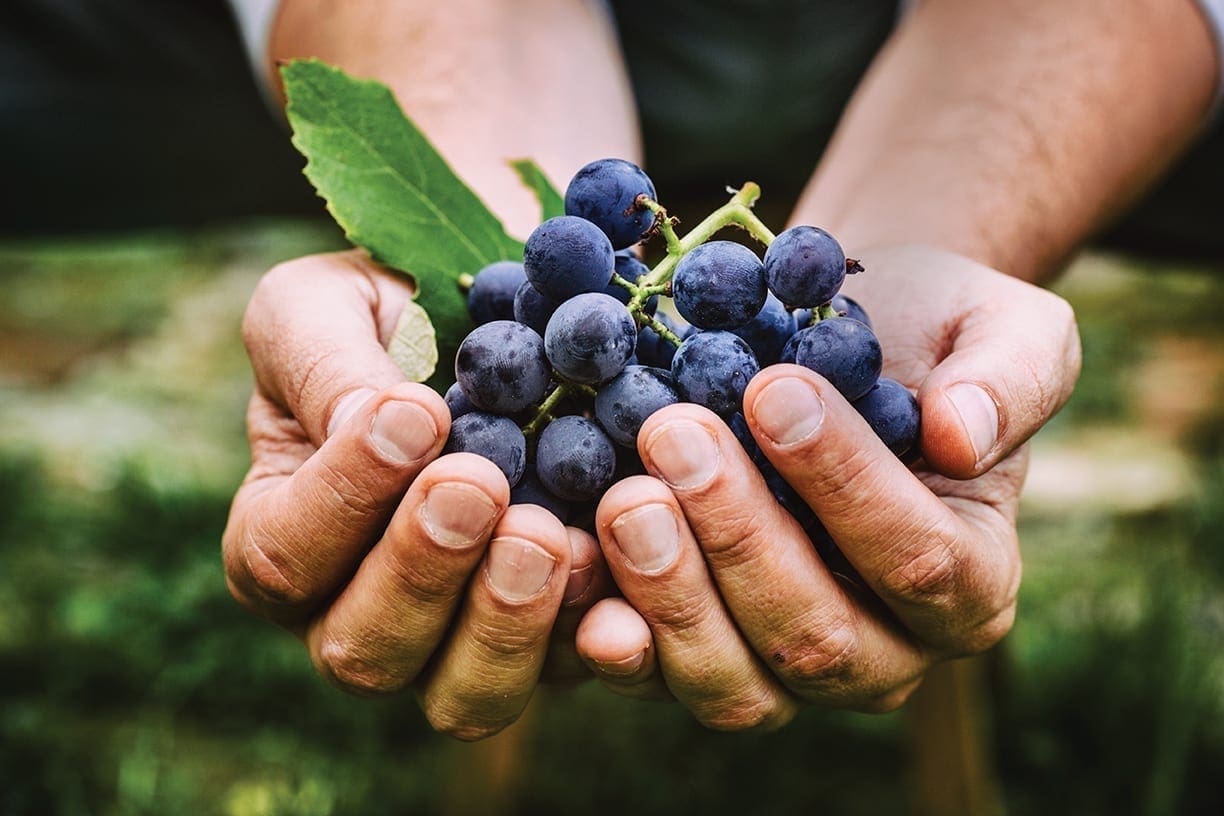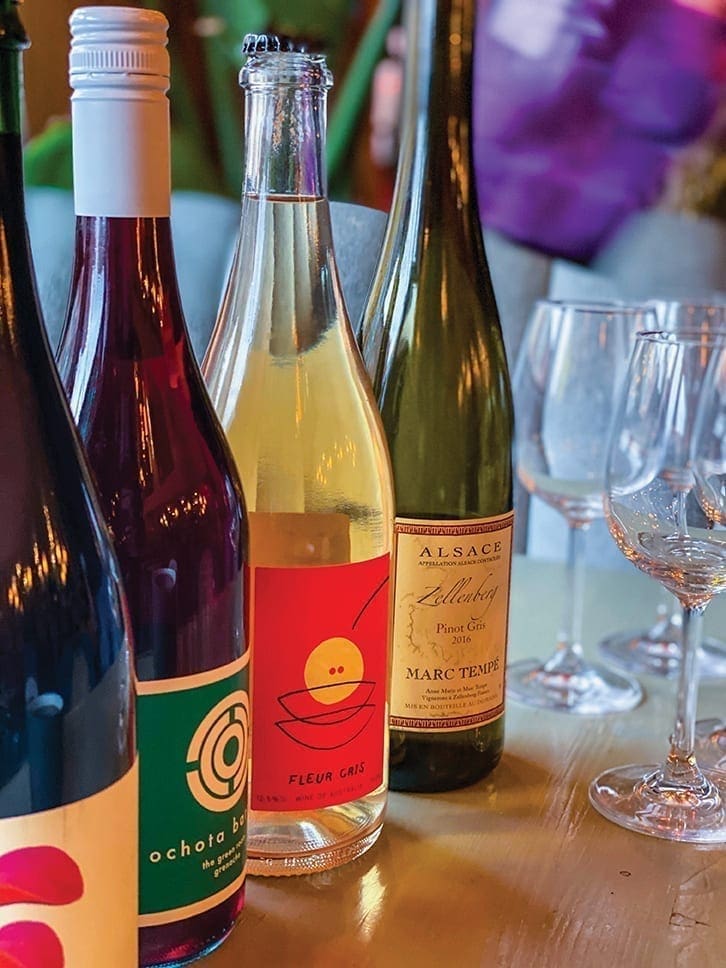The world of wine can be really intimidating for a lot of people.Traditionally speaking, many wine drinkers have favorite wines that they tend to gravitate toward on a list, and they often neglect the idea of popping the cork of anything that they may not be used to. In the restaurant industry this is extremely apparent. If someone walks into a restaurant seeking an “oaky California Chardonnay,” they may get a cocktail instead when they discover that the list does not have exactly what they are looking for. For people who have yet to dip their feet into the world of wine, this can often be a turn-off. It feels pretentious, and uninviting. However in recent years, the rise of a niche category of wine has, in my opinion, worked to change that.
Natural wine is understood to be the practice of making wine with organically farmed grapes that are fermented without the addition or removal of anything (sulfites) in the process. What you get is a final product that tastes and feels more lively, and perhaps one that is better for you in the long run. Natural wine producers seem to take a more casual approach to the branding process, while still taking the crafting of their wines very seriously. This is relieving to see, and feels more approachable for people who want to start drinking wine more often.

For me, I was always turned off to wine by people that were insistent that more expensive is better. Why should wine feel so inaccessible? However, many natural wine producers have minimized the snobbery in the industry that is so off-putting. Of course, there are still expensive bottles of natural wine available, but it is never the only route to take, and with more restaurants including natural winemakers on their lists, accessibility is at an all-time high.
Still, this is met with great pushback from many “old-school” wine drinkers. Yes, natural wine can a lot of the time drink differently than wine that is more processed. It often has a different taste and texture than the wine that many people know like the back of their hand. By farming organically, and refusing any additives such as sulfites in the fermentation process, you get a wine that is closer to reality—I would even go as far as to say a wine that tastes like what wine is actually supposed to taste like. This taste, of course, has been lost to the practice of mass-produced wine.
Admittedly, I am still a newcomer to this intriguing world of wine. I went to Frankie in Jersey City—which offers a fully natural wine list—to discuss a little more about the ever-changing life surrounding natural wines. Rowen McDermott and Rebecca Johnson are the duo who run the show here, and McDermott in particular had a wealth of knowledge to share on the matter.

“In the past, people felt they had to have a certain amount of knowledge to drink wine, it’s almost been an elitist thing. Natural wine has moved away from that—it’s about enjoyment. If you want to get geeky about it, that’s great, but it’s more about opening multiple bottles—trying different stuff,” McDermott told me. As he continued, I realized that much of what matters to the majority of wine drinkers in the country, was unimportant to McDermott. Regions, varietals, and vintages, while still valuable, don’t matter as much as simply pouring someone a glass of wine that they are going to love.
One thing McDermott demonstrated to me during our conversation is how drastically two wines can differ, even if they are made from the exact same grape. He poured me a glass of two wines made from a white grape varietal known as Pinot Gris. The first being a “pet nat” which is a sparkling style of natural wine that is 100 percent fermented inside of the bottle using only natural yeast that is present within the grape itself. The producer, Commune of Buttons, makes distinct and fun styles of natural wine out of the Adelaide Hills region of South Australia. This wine, while technically white, is often mistaken for rosé with its pink hue derived from a slight amount of something in the industry known as “skin contact” (using the skins of white grapes to impart color, flavor and body). What you’re left with is a lovely textured sparkling wine that has slight body and even a flavor reminiscent of cider.

Following this, I was met with another Pinot Gris, but this time from the producer Marc Tempe out of Alsace, France. Of course, the wine was created following the process of natural winemaking, yet it was much more reminiscent of a white wine that the average diner is accustomed to. It differed tremendously from the first wine as it was not sparkling, nor did it contain any skin contact. Honestly, I had to question McDermott on whether these wines were actually from the same grape, or if he was just trying to trick me.
Along with restaurants, more wine shops are beginning to carry natural wine as well. McDermott recommended me to shop at Riverview Wine and Spirits in The Heights, as they carry hundreds of bottles you may not normally see on shelves. Furthermore, Riverview’s owner, Chris Leo, is another reliable source of guidance for natural wines. Much like McDermott, Leo is removing the pretentiousness from the wine industry.
This may be your first time hearing of natural wine, but I can promise you it will not be your last. While many seem to think pet nats and skin contact wine may be fads, the variety and uniqueness of the wines show it is anything but that. What many of these restaurants and wine producers care about more than anything is serving a wine that someone will enjoy. At the end of the day, if the wine in your glass is something that you like, then that is really all that matters.
Peter Candia is the Food + Drink Editor at New Jersey Digest. A graduate of The Culinary Institute of America, Peter found a passion for writing midway through school and never looked back. He is a former line cook, server and bartender at top-rated restaurants in the tri-state area. In addition to food, Peter enjoys politics, music, sports and anything New Jersey.
- Peter Candiahttps://thedigestonline.com/author/petercandia/
- Peter Candiahttps://thedigestonline.com/author/petercandia/
- Peter Candiahttps://thedigestonline.com/author/petercandia/
- Peter Candiahttps://thedigestonline.com/author/petercandia/


